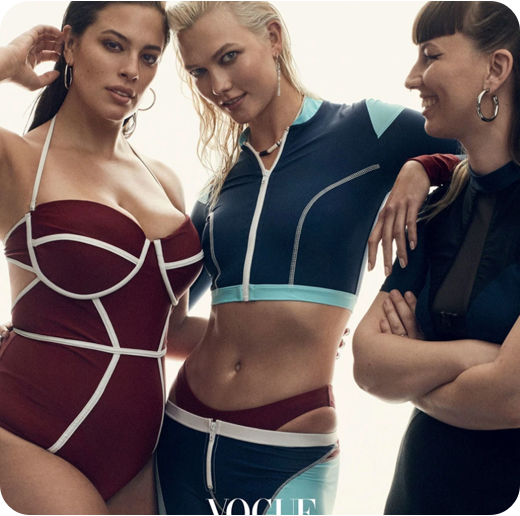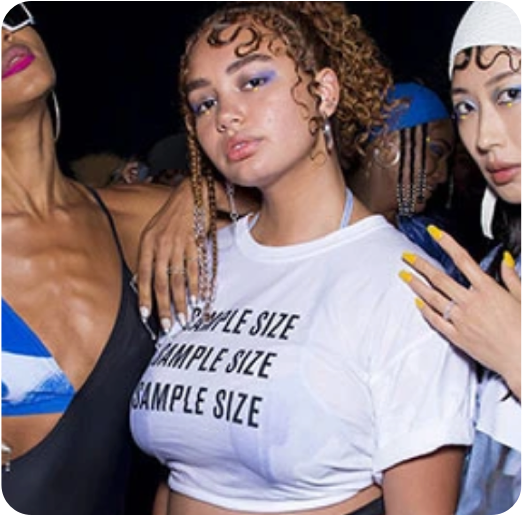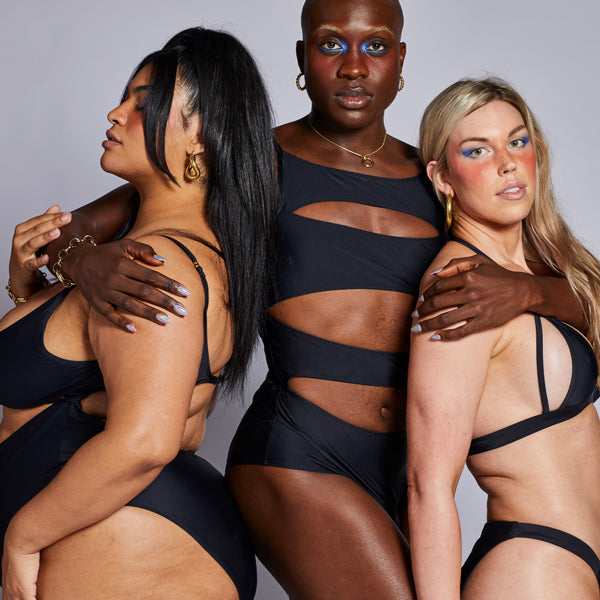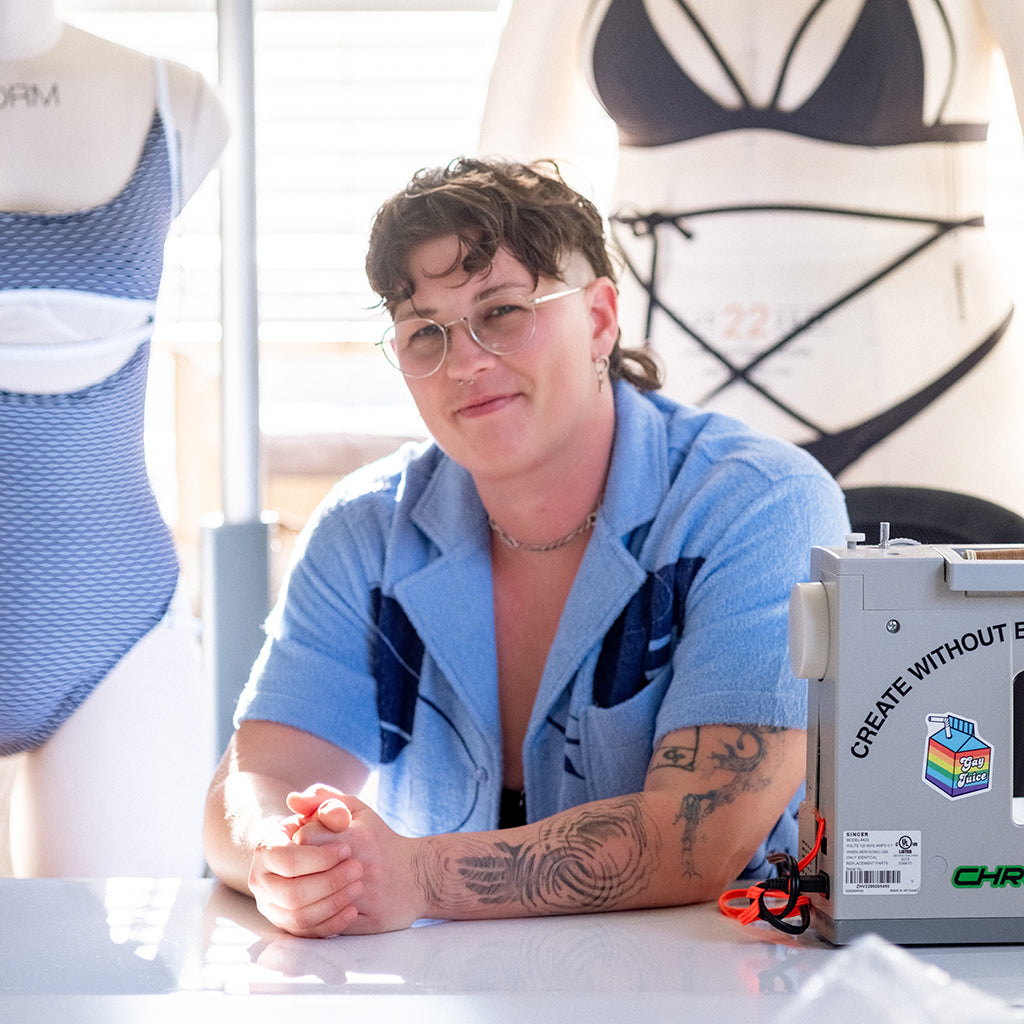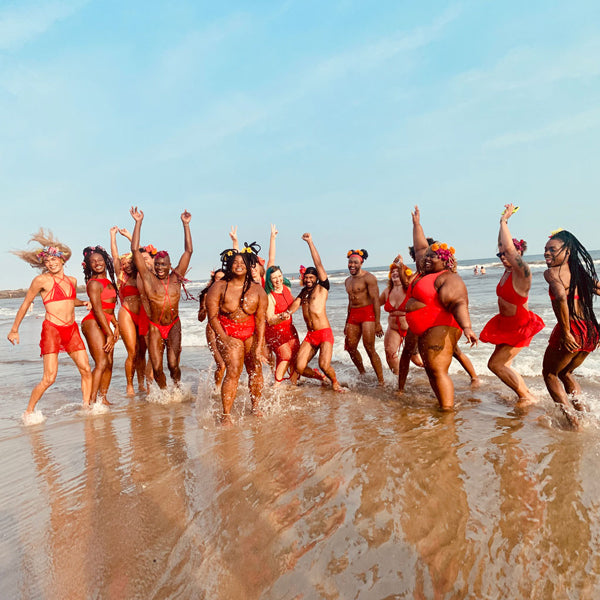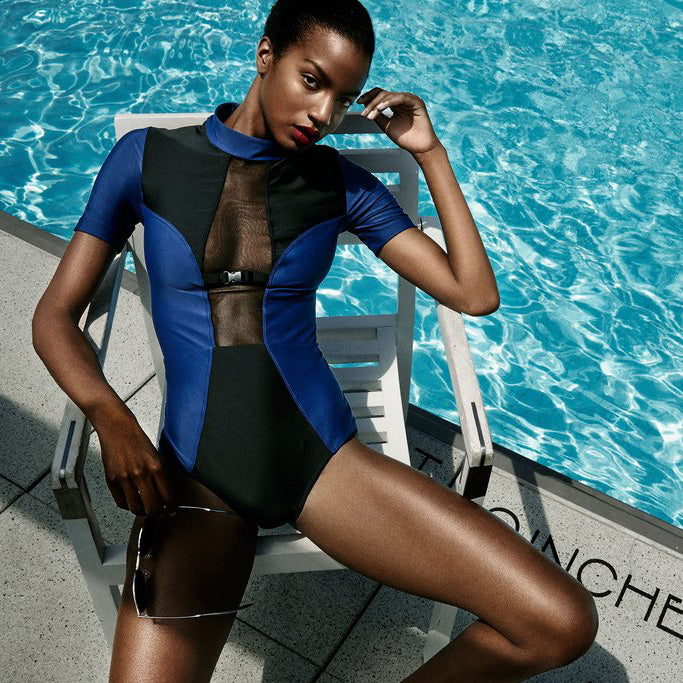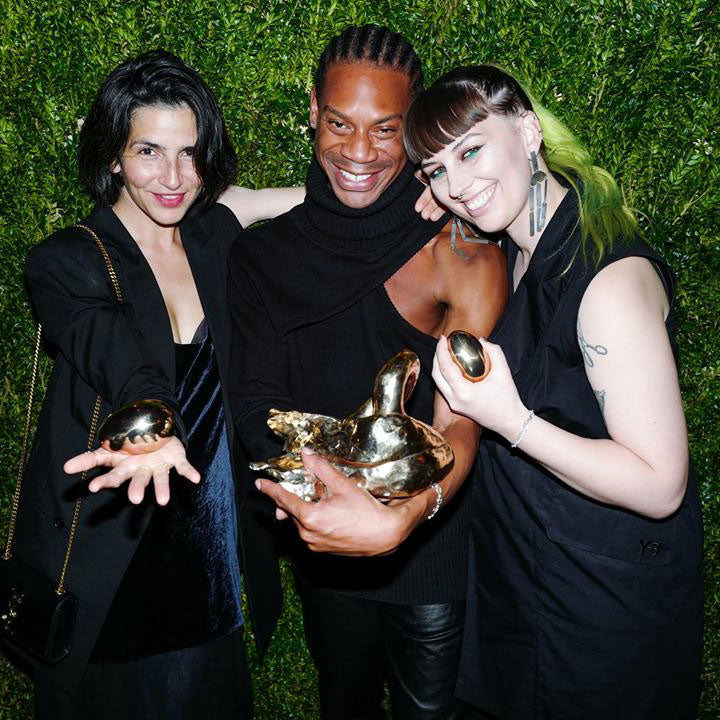The Future of Sport: a NYFW Panel
This season, instead of a runway show for New York Fashion Week, Chromat hosted a digital film premiere and live panel discussion with director Tourmaline, athlete and advocate Andraya Yearwood and ALCU attorney Chase Strangio moderated by Chromat founder Becca McCharen-Tran.
Read on for the transcript of their insightful conversation on the opportunities for gender expansive athletics!
_____________________________________
Becca McCharen-Tran: Hello! We made it! It’s New York Fashion Week!
My name is Becca McCharen-Tran and I am the founder of Chromat. I am coming to you live from the Chromat Studio in Brooklyn, New York. Usually, at this time, I would be backstage running around, putting the shoes on models, making sure everyone's straps were not twisted. But today, I am calling you, Zooming you, from the comfort of the studio. I hope everyone is safe in the comfort of their homes or wherever their livestream is streaming to.
Quick notes about the Zoom. Please utilize the chat. I wish this could be a Zoom Room so we could see everyone's outfits that is tuning in today, but please tell us in the chat what your name is, where you are calling or Zooming from, and please use the chat for questions. This is a live panel so we are here to answer questions. We are going to be taking audience questions at the end. You can also use the Q&A button which is at the bottom of the screen.
Quick note on safety guidelines, we ask that the audience participate in the chat with kindness. If anyone feels like someone is being harmful, please reach out to our moderator, the Chromat moderator, and they will be removed. If we end up getting Zoom bombed for whatever reason, the Zoom will immediately turn off, and a new link will be emailed to registrants.
I’m going to give you a quick intro to our beautiful panel today, and we are going to screen the film, which is a short four-minute film. Then after the film, we will go straight into questions.
It’s my pleasure to introduce Tourmaline, who is an activist, filmmaker, writer, and woman of trans experience based in New York City. She directed the film we are about to screen, and her other recent film, Salacia, was recently acquired by the Museum of Modern Art. I would also like to say, just a personal note that this was my first time, not doing a runway show, but doing a film. The process working with Tourmaline, I know I have told you this already, Tourmaline, but it was just such a beautiful experience. I have learned so much from your process. Every decision we encountered, it was not so much like, "Oh, what should we do?" It was always like what would bring you joy, and I felt that joyfulness and that caring, that love is something you bring to every decision in the filmmaking process. So I hope when people watch the film today, they get that love. But thank you for being here with us today, Tourmaline.
Tourmaline: Thank you.
Becca: Andraya Yearwood is a teenage transgender rights activist and former high school track and field athlete. Some of her favorite pastimes include spending time with friends, learning languages, and shopping. Thank you, Andraya, for being here. Wait, I did not ask you. What languages do you speak?
Andraya Yearwood: Oh, I speak Spanish and Portuguese.
Becca: That is amazing.
Andraya: Thank you.
Becca: Chase Strangio is a lawyer at the ACLU based in New York City. Chase loves sports, cats, and reality TV. Thank you. Oh, yes, you have a cat in the background. Truly living out your bio. I love it. Thank you so much for being here.
So with that, I am going to tell you just a little bit about the film. The film we are about to see is named "JOY RUN". JOY RUN continues the conversation of Chromat's Fall 20 collection, inspired by gender-inclusive athletics. At this time, as we witness athletes like Caster Semenya actively being banned from her own sport because of arbitrarily determined gender policing, we felt it was urgent to offer a glimpse into a new world where all athletes could compete as they are. So with that, I am going to share my screen and witness the magic that is JOY RUN.
[film plays]
Andraya: Trans people and non-binary people are playing the sport because they love the sport and only for that reason.
Terry Miller: They do not get it, obviously. They confuse our personal life and sports. Like, "Oh, it is just sports," but it is no. You are basically telling me that I am not a female so I have to participate as a male.
Chase Strangio: There is no simple way to regulate people into biological categories of male and female. The second that we cede that control to people outside of ourselves, it is going to hurt everyone.
Andraya: I personally do not feel that one would choose to go through all that we go through with transitioning solely to win a few medals. I just do not think that it is realistic.
Terry: They are making it seem like we are the only transgender athletes ever in the whole world and we are really not. It is just that we speak up and we stand for ourselves, which is important. I feel like when other trans people see that, it will really inspire them to do the same, because not everyone is brave or outspoken like we are.
Andraya: If we are not going to, then who will?
Terry: At least get to know my name first before you judge me.
Andraya: My goal is to educate people. I think that is what helps me get through, the misunderstandings or the ignorance or any other negative, I guess, aspect that comes with what we are doing.
Terry: I was not really expecting to be this role model I guess.
Chase: You are excellent at what you do, and I want you to feel that joy and the range of emotions that come with sport.
Andraya: Never in a million years would I have imagined us sitting here now, advocating for transgender rights, or even having to go through what we have gone through.
Terry: We had to fight for our womanhood, and I like that.
Chase: One thing I love about sports is the way in which we can connect with our bodies and build solidarity with other people as we are testing the limits of how we understand ourselves.
Terry: What I love about sports is, I just found a second family. You really create a whole another family and set of friends just being at a track meets.
Andraya: Terry and I, even though we are on different teams and we go to different schools, whenever we are at a meet together, we always say hi, we always start a conversation, we always catch up with each other.
Terry: You do not have to be on the same team, [?] it is be something like, "Hey girl, how are you doing?"
Chase: Having that love and solidarity when the world is telling you you are not lovable, you do not deserve solidarity, that is beautiful.
Andraya: I think Terry and I are my favorite athletes.
Terry: We did it like no other.
Chase: Yes, the fan club--
Andraya: Thank you.
Chase: --is strong!
Terry: The fan club is strong.
Terry: Being an athlete is hard by itself, that is clear, especially because we are student athletes. We are not just athletes who just pass by. We actually do our school work, and we still managed to do that for... Well, Andraya for four years and me for three. I mean, I am very proud of both of us.
Andraya: I think our transness is the best thing in the world because it makes us who we are.
Chase: What is the potential for my body and how can I decide what that is? I think that trans people are the ultimate guides for sport.
Terry: Where I am now is a place I am happy. It took so much dedication and everything, but I did it. So it shows that I am capable of anything, really. Listen, I do track, but off the track, I am that girl.
[film ends playing]

Becca: Yeay! That was beautiful! Woo, claps! Like we are in a real movie theater. Oh, thank you so much. Thank you. Thank you for tuning in. If you are just joining us, we are with director Tourmaline and two of the stars of JOY RUN, Andraya Yearwood and Chase Strangio. Also, shout out to Terry Miller who was also a star of the film, and shout out to the other #ChromatBABES, Maya Margarita, maya finoh, Jerron Herman and Chella Man. We had an amazing cast!
Tourmaline, can you tell us a little bit of background about your inspiration behind the film JOY RUN?
Tourmaline: Yes, I was so honored to be invited to make the film, and part of my practice is looking at my dreams and the dreams of others. So with that, I really want to make a dream team. I was watching the Jordan documentary and thinking back about my childhood, playing sports, and loving sports. I thought, "Well, who would be on my dream team?" "If I was going to be watching a dream team, who would be on it?" I knew immediately that our cast Maya, maya, Chella, Jerron, Terry, Chase, and Andraya. They are all people who were making dreams, not only seem viable and possible, but really actually material. Each and every single person who took part as the cast in this film is already living that dream. A dream of new ways to be embodies, new ways to be in sport. Maybe it is the sport of showing up, or the sport of looking good on the swing set, or the sport of running track, or the sport of being incredibly precise with our language while we are litigating and pushing the world and demanding more. So, to me, every single person who was cast in this film is the dream, is the dream team, are the dreamers. It was a real beautiful opportunity to showcase that.
Becca: It is amazing. Andraya, the dreamer, could you give us a brief history of how you became such an important figure in the movement for trans people living freely and competing in sports? How did you get here?
Andraya: Okay, yes. So, I think it all started in high school and in my freshman year, specifically, that is when I started running track as a female and on the female team. Through me doing track throughout high school, I had garnered some attention, I guess, through my accomplishments within the sport. Then through that attention, it opened doors for me, specifically doors in which I can further advocate for the change in the community, especially within sports and within Connecticut, and I guess in the State as well. Then those doors had just allowed me to speak up, to tell my story to whoever would listen. I guess it is track, in general, and then through track advocacy.
Becca: I love it. Thank you so much. Chase, can you tell us a little bit about your work representing Andraya in court and some context for the fight for trans inclusion and sports?
Chase Strangio: Yes, it is just so beautiful to be here and share this space. My history of working with Andrea is so meaningful to me and my history of working with Tourmaline as well, and you Becca. So, thank you for bringing me into this space.
I always was thinking about the ways in which the attacks on trans lives are so intimately connected to our willingness to inhabit our bodies in ways that feel so expansive and therefore threatening to people. It seemed like it was only a matter of time before all of this discourse around trans people entering different physical spaces move to the site of sport, which has such a long history of sex regulation and control over sex bodies.
One of my first experiences with that as an advocate was watching what was happening to Andraya and leader Terry in Connecticut, and the ways in which all of the forces of government and all of these cis individuals were leveraging their power on Terry and Andraya, specifically. So, Andraya and I connected at a time when cis athletes were going on Fox News and building a whole campaign to try to stop Andraya and Terry from running. That escalated over time from the realm of the Fox News conversation into litigation in Federal Court, and now, escalating even further with the Trump administration bringing separate litigation in Connecticut, all essentially, focused around Terry and Andraya in one way or another.
I have been able to work with Terry and Andraya for the last several years to defend their ability to continue to not only keep running because now they have graduated from high school but also to maintain the wins that they had. Because, I think, one of the things that is so insidious about what the Alliance Defending Freedom and others are doing right now is not only are they trying to entrench in law these really dangerous notions of what sex means but they are also trying to take away people's joy, and not just forward looking joy but actually erase their history. They are in this lawsuit trying to erase the records of Terry and Andraya's wins over the past three years. So, we are fighting in Connecticut, we are fighting in Idaho, and we are just going to keep trying to ensure that people can not only maintain their ability to compete on equal terms as their peers but also that all of us can inhabit our bodies freely.
Becca: Thank you for doing that. Thank you for being out in the street fighting for trans inclusion in sports. It is so important. Chase, I know you are not new to this. You are true to this. So thank you for all your work.
Andraya, amidst all that with the court and everything, what is it that you really love about sports? How did you get into sports in the beginning?
Andraya: I got into sports from my family because ever since I was little, my parents have always instilled in us to always do something after school. We were never really able to come home after school and just stay at home. It was always something we had to be doing outside of our education. My siblings and I had always just gravitated towards sports, soccer, basketball, football, anything like that. Then, I guess that just stuck with us throughout our years.
Becca: What is it that you love about sports?
Andraya: I think just the social aspect of it, and how your teammates can be so supportive. Not just teammates, but I guess people you run against, so even your competitors. Even though they are people you are trying to beat, they still are there to give you a pat on the back or say, "Congratulations on your win." Like for my friend Terry, how we are in a way competitors and we could run against each other. But, as to me, we still say hi to each other, we still have a conversation. We still ask, "Hey, how are you? How has your day been?" I just think that the camaraderie within sports is very important. I think that is what has gotten me through it, through everything that I have gone through.
Becca: That is amazing. Yes, the love that you have for each other and the love for just the family that is created in sport, it really comes through with what you said in the film.
Tourmaline, I know you also have a history of athletics. What is it that you love about sports?
Tourmaline: Yes. Making this work really inspired me to get back into my history of being an athlete. I used to run track also and wrestled. It is so interesting to be like, "Wow, this actually really, really matters to me." This is not a lightweight thing. It is a playful thing, but it is not a throw-away thing. Sports are, like Terry was saying, it actually really matters.
I love the feeling of being in my body. I love the idea of coming every day to subtly shift my beliefs about what I can do in my body. I love the abundance of different forms of sport. It is like from track to soccer to wrestling to staying in bed all day. Just the abundance of telepathy, sport of like, "Hey, where am I in the park?" I play this game with my friend, "Come find me." "I will not tell you where I am, but you have to catch the vibe." That is a sport, too. So, I think that to me, that the level of playfulness and lightheartedness that is a part of what I was doing sport for, is so necessary right now. That level of joy and cultivating that is so important right now. I love basking in that. When we had our shoot with Jerron and Maya and Maya and Chella, that was just so beautiful, being in that playground. It really reminded me of what the capacity and potential for sport can be.
Becca: It was such a joyful day. The day of the shoot. It was like the moon in Scorpio…?
Tourmaline: I will look it up.
Becca: A very playful moon was happening.
Tourmaline: Yes.
Becca: I think it was a new moon in Scorpio.
Tourmaline: I think if it was a new moon, then it was a new moon in Leo.
Becca: Yes!
Tourmaline: Because we shot in Leo season.
Becca: Yes. It was full-on Leo season.
Tourmaline: Yes, it was a new moon in Leo. Oh, shit, that is right. It was a new moon in Leo. It was wild.
Becca: Oh, it certainly was.
Tourmaline: And those intentions. Yes.
Becca: Okay, Chase, so what do you love about sports? Where do you see opportunities for athletics to evolve and transform?
Chase: Yes, I have always found such a home in sport. Like Tourmaline, I think I like to conceptualize sport as all of the ways that we can imagine possibility in existing in our body. So, it could be my favorite sport now which is reality TV marathoning, but also growing up, being a soccer player. It was the only place where I could get outside of the deep trauma inside my head. That was a way for me to sort of exist in my body.
Also, share in the excitement and the competitiveness and the thrill of being in proximity to others who are similarly challenging and exploring themselves. I think, as a trans young person who did not know how to externalize and vocalize my experience of transness, sport was the way where we were playing with our bodies and imagining what they could do.
Even though I did not have the language that I acquired around transness, it was my earliest experience of gender play. That feels really meaningful in my evolution as how I am always coming to understand myself. I think we can see in sport, there are endless possibility for individual disruptions, what can I do that I did not know that I could do? As well as societal disruption, how can we collectively change what we believe possible in the power structures that are trying to limit us?
This is where you can see law interfacing with sport, where law has this impulse that comes from a deeply colonial white supremacist impulse to use category to constrain. So, I am going to name who can be a woman so that I can define who is outside that category. But if we think about sport as the way in which our bodies can be so much more capacious is actually a place where we can challenge that impulse, that there is something bigger than the structures that are imposed on us that come through experiencing our bodies and these multitudes.
I love this film because I am so used to contending with sport on the narratives and in this defensive posture where we were responding to assess restriction on what trans people can be in sport, and this is such a beautiful way, an entry point of... Well, if transness is the way that we imagined what sport can be, there is just so many more possibilities and that to me is so exciting. It opens up so much about how we could imagine a wrestling space that is just about how do we challenge our bodies and connect with each other.
Wrestling is actually one of the best examples because it is a place where there is so much gender disruption and that there is all these ideas of how... It is a weight class sport. It does not have to be about binary sex bodies and I think I love that. I think there are so many opportunities for us to change how we structure our society through sport.
Becca: I am obsessed with the future of sport that we are cultivating right now.
Andraya, what is one thing that you wish people knew about trans people in sports?
Andraya: I wish people knew that we do sport because we love it, and I feel that there still is a huge misconception as to why we do sport. For example, people say it is because to win medals or to get to stand on the podium in first place, but I feel that this is very unrealistic. That is not why people do sport. There is just so much more to it. Sport is not just about the result or what comes afterward. It is about more than... It is again how you offset it, how you feel in your body while doing it. It is about, again, the social aspect and how you’re doing that sport, how it makes you feel. I [wish people] knew that we do sport because we love it, not for any outside reason other than that.
Becca: Amazing. Okay, Tourmaline, I have a question about your process. In your recent Vogue op-ed you talked about the need for freedom dreaming, and how you approach freedom dreaming with three questions. Can you talk a little bit about your questions and your process?
Tourmaline: So my process is, so this freedom dreaming questions speak to the long history of the black freedom struggle and freedom schools. Some people call it the civil rights movement, but it is a really long movement of asking questions and answering them and sometimes asking the same questions every day to get deeper and deeper in the answer.
The three questions that I have come to arrive upon through so many brilliant teachers who came before me, who were freedom dreamers, who helped me learn about freedom dreaming, are:
What does the dominant culture have that we do not want?
What does the dominant culture have that we do want?
What is our community? What do we have already that we want to keep?
So to me, I think it is really important to identify the gender binary or the biological essentialism. There are so many and we could spend the whole night talking about what we do not want, but I think it is really important to say we know what we do not want.
Let us think about what we do want. It is really amazing watching Terry and Andraya streamed through the internet. That is something that the dominant culture has, put in the big platform up there and putting really important people, iconic people. Terry and Andre are my favorite athletes, literally, my favorite athletes. They did it like no other. I think that to me, like you saying that huge platform of the dominant culture and saying, "These people are important, pay attention." That is something I would keep.
Then, what do we have already that we want to make more of. We have our capacity to dream. We have our capacity to resource each other. We have our capacity to look at a problem and generate the solution. We have the capacity to ask questions and offer answers. We have an incredible capacity to make more of the beautiful things that are already here. So to me, that is really what my process is in this film.
Becca: It’s really interesting. I know we talked before on how Tourmaline and Chase, you two go way back and you have worked together. It’s so cool, Tourmaline, your trajectory from working in community building in a very [social justice] organizing way, and now in a visual way. How has the transition been into this kind of visual field from an organizing perspective?
Tourmaline: Yes, it is funny because sometimes I have to catch up with myself. I was with my friend Sophia, and I was like, "I guess I am an artist now." Sophia was like, "Yes." It is sometimes, I have to be like, "No, this is my reality. I am doing this thing." I think this moment is great for us all catching up with ourselves. When there is action that is moving a little bit slower on the outside, it is a great time to be like, "Where am I now? This is a new segment." New segment, pandemic. New segment, mass uprising. New segment, days on days of reckoning. Days on days of mutual aid. Days on days of support.
Who am I, and how do I want to show up in this moment? Whether it is remembering that I am an artist or remembering that I do not have to leave organizing to continue to be an artist and doing cultural work and cultural organizing. I think it is really wonderful that this project is prompting me and I think others to catch up with ourselves, right? Who am I now? How do I want to move forward in my life now moment? My now reality?
Becca: That is amazing. So my last question for all of you, and I will start with you, Andraya. The question is, how is your transness the best thing in the world?
Andraya: My transness is the best thing in the world, because I think it makes me who I am today and again, without me being trans, I would not obviously be who I am. I do not think I would be here today. I would not have gone through all that I have gone through whether good or bad. If I was not trans, and I can use what I have gone through to then, I guess, as I have been doing, speak out and then advocate for not only myself, but now I have a whole community. I can now help to advocate for it. I can now support and love unconditionally. So, I think that my transness is great because it allows me to do things that I would never thought I would be able to do. I would have never seen myself do at all. So, yes.
Becca: You really are creating such a legacy as we speak. Being a defendant in the lawsuit, you are creating a pathway for trans athletes to compete in Connecticut in the future, and I am excited for the next generation to keep smoking the track.
Andraya: Definitely, yes.
Becca: Who wants to go next? Tourmaline or Chase? How is your transness the best thing in the world?
Chase: So, it is my favorite question. I think, especially in this moment, I feel it connect... I think it is such a dynamic thing and I can see that right here, which is that it has connected me to all of you. In the decade that I have known and worked with Tourmaline in different ways. The ways I have gotten a chance to get to work with Andraya.
My understanding of myself has shifted in that process. It is such a gift to experience oneself in liminal spaces and realize that we have the potential to draw from endless possibility and our non-linear journey to understanding ourselves. So, I just feel so blessed that I get to share space and inherit the legacies of work that people are carrying and the willingness that people have to share with me and I have learned so much from Terry and Andraya and from Tourmaline. It is the ways in which our willingness to push each other and learn and challenge expectations has been just instrumental in me being alive.
The other best thing is that I know that there is no difference between sex and gender and that we have to stop making those distinctions, in my view, because I think the more that we fixate on the body as something that is existing outside of context, the more we exert violence on ourselves and others.
Being a parent, I had all these experiences with other parents who were like, "Oh, well, we just help our kids understand their bodies by being like, 'Those are girl parts and boy parts,'" and I am like, "Hold up, that is not going to work here." Just the idea that I understand that my body parts are contingent on the political and social context and meaning that we impose on them and I am like, "That is such a gift because there is so much possibility there." So that too. I learned that from Tourmaline.
Becca: Tourmaline, how is your transness the best thing in the world?
Tourmaline: Every day, there is a new reason, right? Today, it is like, "Look at the fabulous people who are in the chat." "Look at the fabulous people who are on the Zoom call." "Look at the fabulous people who made this film behind the scenes." "Look at the fabulous people who were on the playground." Every day is literally a new reason about why my transness is the best thing in the world.
I think that it is so cool that we get to be the realizers of our dreams by looking at a landscape that previously did not include us and say, "Actually, we belong there." Day by day, whether it is small actions or large actions, create a reality where we are there. We are part of the landscape. You can never take away what Andraya and Terry did. You can never go back to reality where we are not all on the Leo New Moon, hanging out in a playground, making some movie magic. You cannot take away Chase's everyday brilliance of speaking on television, speaking at the Supreme Court, speaking on the Zoom call, speaking on the one in one in creating a reality where we can be the fullness of who we are. So, to me, that is just... There are no words for how beautiful that dream and realizing it. So, today is the best day ever.
Becca: Thank you so much. I am so inspired by all of your work, and it is really cool to be in this space with you. It is an honor.
Okay, we are taking questions from the audience. This is live! We are here to interact.
Okay, I have one question. The first question is, how can everyone support trans and non-binary people in sports?
Andraya, I know, in the film, you talked about how you deal with misunderstandings. You have really charted the path in this direction. So, if you were in high school again and running again, how can other people support other athletes that are trans/non-binary in the future?
Andraya: I think that just educating... First, educating yourself on trans bodies and non-binary bodies and their community as well. What we go through and just who we are as individuals. I think education is really important. As I said, the first step and then once you are educated on who we are and what we do, you can then use that newfound education, that newfound knowledge, to, I guess, in a sense, help.
One example is, say if someone says an ignorant comment or something, you could then correct that person and educate them on why that was not a correct thing to say. You need to catch yourself doing it, saying, "Okay, I should not have said that or I should not have thought that," and then why. I just think the first step is education, and I think you educating yourself and educating others could go a very long way.
Chase: Watching this film [reiterates that] we all have a role to play in creating the conditions where people can experience joy in what they are doing. Sport is a reflection of the world in which we live, but it is also sort of a manifestation and producer of it.
The more that we challenge ourselves to break down our reflexive ideas about what is biologically determined and what is essentially true about our bodies. What does it mean to have hormones that we live with and that we play with? How does that impact our bodies without relying on these incredibly cis-centric notions of binary sexual difference that are really constraining our ability to engage in sport, but also constraining the ability of sport to be what it can be? I think we all have a role in building that joyfulness that can come that is also really transformative.
Becca: We have another question. What would the future of sport look like without gender restrictions at all? Is the idea of weight classes ideal for all sports?
One thing I felt when I was talking to you, Tourmaline, about this film, I was talking about how sport could be more collaborative in nature or more based in creativity and you were talking about a sport of telepathy.
Tourmaline: Yes, I think that this question is so important and speaks to a larger question, which is the question of the creation of the gender binary, and they are the everyday reconstruction of it. It is not really continuing to serve us. What do we gain by releasing something that was not ours to begin with? I think about just all the institutions that are reproducing the gender binary. I think about when I was so young, listening to Angela Davis, talk about the prison as the place that reproduces the gender binary, right? In very violent ways.
I think that there is an abundance of answers. I certainly do not have all of them or any of them. I do not have one of them. I love sitting with the question though and imagining what the world without the kind of violent reproduction of the gender binary can be. I love the game of telepathy. I love the game of staying in bed all day and doing as few things as I can. That is such a sport for me or lounging in the park. Part of what the dream team on the playground was modeling was that athleticism, too. Jerron's dancing. Maya's swinging. maya's amazing presence. Chella playing basketball. All of these things are so powerful and are not reproducing the kind of gender binaries that I do not think are here for us. That is more questions than answers, but that is what I am thinking about with that.
Becca: Okay, another question that I have is, what is the most exciting thing you hope to see happen in sport within the next decade? Chase, I feel like this is your question, because you are so much about physically creating the future through legislation and beyond.
Chase: Well, I do think I am instrumental in creating a constrained future through my very compromised interventions and all. I think that we have to hold that. Engaging with the laws necessarily is unimaginative. Every time we utilize law as a tool, we are reproducing a lot of the harms that were simultaneously tried to break down.
But what I want to see in sport is more athletes who are trans and intersex and non-binarybe centered and remind us that our bodies are not set up to be funneled into these categories that we want to place them in. That in the conversation that we also come to understand that we, through challenging what we believe to be possible about breaking down sex binaries, we actually will change how our bodies can be physically constituted in the world.
Doing work in this space has been really interesting. I have learned tons about how hormones respond to different external forces and that actually, we have, if we are given more stimulation and if we are pushed and if we are believed in more, our chemical makeup changes. We do not even know what is possible and how our bodies exist in the world, because we are shutting it down from the start.
I believe that this conversation about sport is going to open up how we can inhabit our bodies and that in turn is going to change how sport is performed. That hopefully, it will not just be through courts and not just be through legislation, but also through performance and the ways in which people are able to be excellent without being shut down and that is going to be the site of the ultimate transformation. In litigation, we will do what we can to hold back the mechanisms of the state but that is not where we will find our liberation.
Becca: Yes, wow. I need a transcript of all this because there is so much truth being dropped. I cannot even absorb it all. Everything is so on point, and I really appreciate that. Okay, so the last question. We are going to wrap up. Well, actually, I kind of wanted to hear Andraya. In ten years, what is the sport that you want to see in the world?
Andraya: In part of what Chase had said, I just want to see an environment where everyone is accepted for who they are. People not being singled out, because, "Oh, you are different in this way?" or, "Oh, you are different in that way." Then, with them being singled out and then them not being eliminated from that sport just because they are different. I just hope that society will learn from these mistakes and will learn that, "Okay, this is doing more harm than it is good." With that realization, can then make or create an environment where we are aiding people in sport, not just tearing them down, again, just because they are different or just because there is something other than the normal.
Becca: Exactly.
Tourmaline: That is exactly right. That is exactly right.
Becca: The chat is popping. I really appreciate everyone throwing in their thoughts. It is really cool to see so many people engaged in this freedom dreaming of athletics, where all athletes define sport on their own terms. Chase, I really feel something you said in the film. When we see the control of our bodies to other people's definition of our bodies, we give up so much. I really feel that that is so true. So, yes, I am just sitting with so many thoughts right now.
Tourmaline: This is powerful. From the chat to the brilliant questions, to the brilliant panelists, to everyone who worked on the film. I am like, "Oh, there is no such thing as just for." This was wild and this is really powerful. So, I am feeling really emotional Cancer.
Becca: Did you see in the chat? Someone was like, "We need a podcast or a youtube channel with Tourmaline's reassuring and contemplative thoughts.
Well, with that, I feel I just want to thank Andraya and Chase and Tourmaline for being here tonight and sharing your thoughts. The future that you are envisioning and visualizing is so creative and rich and exciting and beautiful. I am so excited for that future. The future is now. You are creating it, you are doing it. It is happening right before us. What an honor. What a joy.
Tourmaline: What a joy. Thank you.
Becca: So thank you so much.
Tourmaline: Thank you, Becca.
Andraya: Yes, thank you.
Chase: Thank you, Becca.
Becca: Thank you. We are going to drop the YouTube in the chat for anyone who wants to go watch queer joy... Watch JOY RUN and share with their friends. So, thank you everyone.
Tourmaline: Thank you, everyone.
Andraya: Thank you.
Chase: Thank you.
Tourmaline: This is so wonderful.
Becca: Happy New York Fashion Week!
Tourmaline: Happy Fashion Week! Bye, all.
[END]

